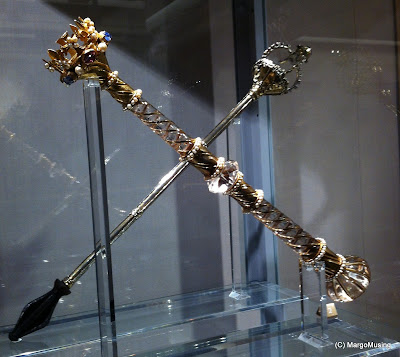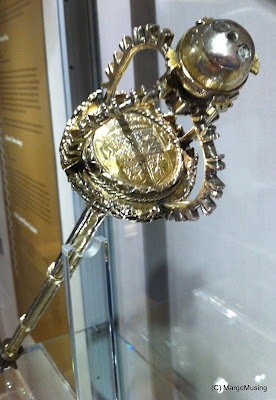I'm very lucky to live close to Bath, which has two lovely independent bookshops, Mr B's and Topping and Co Books, both of which regularly arrange events and signings.
One of the most recent was an event organized by Toppings, featuring Professor Mary Beard, who was in Bath to talk about her new book, S.P.Q.R.
Prof. Beard is a very interesting speaker: she spoke about how questions may be raised about whether there is a need for more books about the Romans, and a lot of what she spoke about were the new developments in archaeology which have produced new information and new insights into the past, but also made the point that historians in each age ask different questions, so of course what they discover, and how they interpret information, varies.
One example she gave was that in the past, (male) historians have tended to assume that Roman barracks were very masculine spaces , but the number of children's shoes
Beard spoke about a number of recent developments and discoveries which have provided new information, for instance:
- Analysis of ice core samples from Greenland which show signs of pollutions from Roman mining operation in Spain
- Analysis of teeth from Roman burials which show the climate (and therefore, to an extent) the region, in which people spent their childhood (or at least that part of it during the period their 2nd teeth were growing in). This has been particularly interesting in looking at the teeth of Roman Britons. It seems that around 20% of the Roman population grew up in significantly warmer climates,which suggests a much greater degree of movement within the Roman world than previously thought.
- Analysis of the material found in cess-pits in Herculaneum, which gives information about the diet of ordinary people, whereas in the past, the main evidence has been from Roman writing, where descriptions of food have tended to be about the banquets of the rich, not about normal, every day food. The new evidence shows that ordinary people in Herculaneum were eating a lot of fish, chicken, eggs, figs, sea-urchins, pork, and pepper (which would have been imported, and presumably, expensive)
As well as new scientific evidence, she explained the there are also, still, new literary discoveries to be made - around 10 years ago a new essay of Galen's was discovered in the library of a monastery in Greece.
She explained that she Chose S.P.Q.R. as title as she wanted to include and focus on the 'Populi' - the people of Rome, not just the senate or aristocracy - and in particular to think about women and their role.
I would like to read the book, but admit that I shall wait until it comes out in paperback - the hardback is vast and heavy! But I may be re-reading her book about Pompeii in the mean time!














































